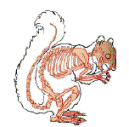Sandra Bullock in Gravity (dir. Alfonso Cuarón, 2013).
One review I've seen called Gravity an "intellectual blockbuster," comparing it to 2001: A Space Odyssey. Actually, it's not particularly intellectual. It's a lot of things: emotional (in a way that some might experience as "spiritual"), spectacular (it looks like several brilliant artists' and scientists' minds exploded onscreen), somatic (not just in its ability to thrill and startle, but in the disturbing vertigo of weightlessness it induces throughout). What makes it feel like there's deeper thought happening is the cumulative effect of all these elements. There are few if any instances of blatant symbolism, for example. Instead, the "deeper meaning" of the movie insinuates itself via the wiped-out, vulnerable, imaginative mood that follows the viewer out of the theater, a mood in which the mind is primed to wander poetically through whatever mortal territories.
In other reviews, I'm seen complaints that Sandra Bullock's character Ryan Stone is portrayed as too weak, indecisive, dependent on others' help. These viewers would prefer that she be a take-charge badass like Ripley in Alien. But this shows a complete lack of sympathy with the aspect of the film that makes it most memorable and moving: Stone has largely given up on life. Her survival drive never kicks into full gear; it's always just the best she can do at the moment. The pathos of her extreme vulnerability is amplified by the audience's anxiety that she may be too beaten down by her own sorrow to confront the challenge that confronts her as aggressively as needed. And this in turn makes every little last-second thing she does right seem like a major victory.
I've also seen the complaint that the script is weak. This depends on how you define "script." True, Stone's dialogue is mostly stuff like "Oh no," "Help," and "I hate space." When she does start to soliloquize, it's spare and sentimental. Bullock, in other words, is made to play more or less the same person she always does: a slightly tongue-tied, above-average fumbler. Here, however, the traits that make her comic identity quirky and winsome make her dramatic one seem damaged and scarily real.
The strangest part of the movie is George Clooney's character, Matt Kowalski. His role as affable guardian angel is so exaggeratedly providential at times that he might as well be an actual angel--a laughable suggestion that's never quite made by the film, but still tangible enough that the visible signs of Kowalski's humanness (desire for vodka, flirtatious comments, general rakishness) seem almost like decoys to keep us from grasping the truth too soon. Even if we don't want to go all the way there, it's striking how Kowalski never seems quite real, and how this somehow doesn't seem like a problem. Clooney, needless to say, is perfect for the part.

































